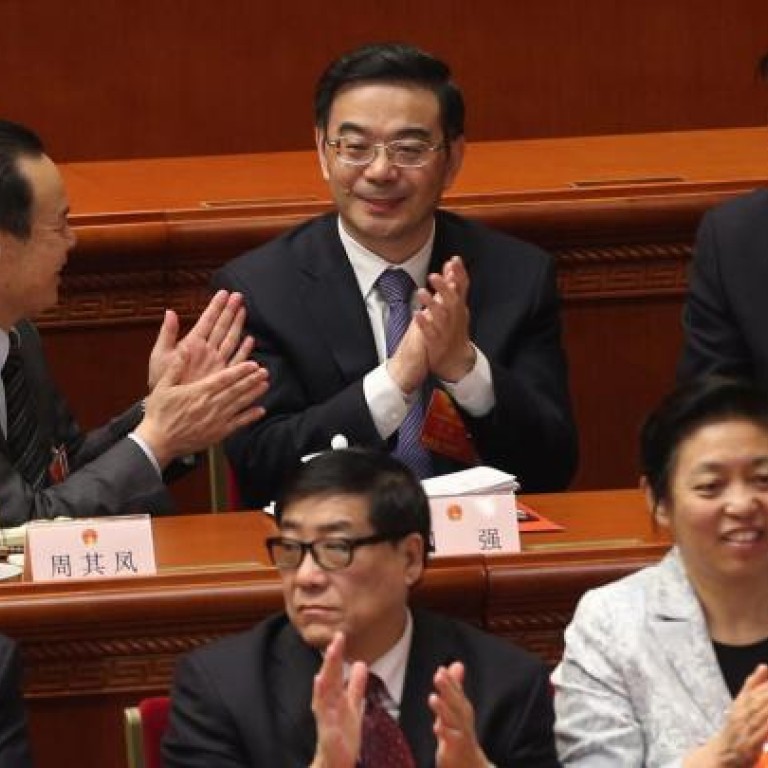
Zhou Qiang's new role as the top judge is largely symbolic
Zhou Qiang is the new Supreme People's Court president in a position that is largely symbolic
Until his failure to win a seat on the Communist Party's powerful Politburo at its national congress in November, new Supreme People's Court president Zhou Qiang had been viewed as a rising political star.
Hu Chunhua and Sun Zhengcai, both three years younger than the 52-year-old Zhou, have now eclipsed him on the political stage after joining the 25-member Politburo, and are in pole position to become the core of the party's sixth-generation leadership.
Zhou's new post as the country's top judge makes him a state leader but it is also a more symbolic one in a country largely ruled by the party rather than the law. Still, given his relative youth among the party elite, Zhou, unlike his predecessors, could still join the Politburo in the future if made the top official in charge of law and order.
A source close to Zhou said the former Hunan party chief would have preferred to become party secretary of a province with robust economic development prospects, such as Shandong, because that would have given him more real power.
"He will enjoy little real power even though he is nominally the head of all judges at different levels across the country," the source said. "When you consider that the wages and benefits of his subordinates are largely provided by regional governments, you will immediately figure out whose orders they will listen to."
Sixteen years ago, when he headed the Communist Youth League, Zhou was considered an important member of the camp - the power base of Hu Jintao who stood down as president on Thursday - and was being groomed to become part of one of the People's Republic's sixth generation of leaders in another 10 years.
Born in April 1960 in Huangmei county, Hubei, Zhou came from a humble family. His father was a local party official.
Zhou was sent to the countryside in Huangmei county as an "educated youth" during the Cultural Revolution.
He entered the prestigious Southwest University of Political Science and Law in 1978, after taking part in the first university entrance examinations following the decade of chaos that was the Cultural Revolution, and earned a bachelor's degree and a master's degree from its law school.
Chen Zhonglin, the head of the law school at Chongqing University, who went to university with Zhou, said students wanted to help to restore order.
"For law students at that time, we acted with that sense of stewardship in mind, thinking of what was appropriate for the whole system to get back to the rule of law and not simply what was best for our firm," Chen said. "In addition to his legal background, Zhou also has regional and ministerial experience. In that sense, he may help implement and streamline the rule of law."
In addition to his legal background, Zhou also has regional and ministerial experience. In that sense, he may help implement and streamline the rule of law
Zhou became a clerk and a junior official in the Ministry of Justice after he left university in 1985, and served as deputy director of the general office and director of the office of the minister.
After serving as director of the ministry's rule of law department in 1995, he became a member of the youth league's secretariat.
The many years Zhou spent at the youth league appeared to help his political career, as he became a protégé of new Premier Li Keqiang, whom he succeeded as league head in 1998.
In 2006 Zhou became one of the youngest provincial governors, in Hunan. His interest in reform of the justice system was apparent when he pledged to create a "Hunan governed by law".
Chen Jiping , secretary of the party's leading group at the China Law Society and once secretary to former National People's Congress chairman Qiao Shi, praised Zhou's commitment to legal affairs.
"Zhou Qiang is an intelligent person, and is passionate about legal affairs," Chen said.
Zhou became party secretary of Hunan in 2010 but his commitment to ruling by law was plagued by scandals.
Tiananmen activist Li Wangyang was found dead in mysterious circumstances in a hospital in Shaoyang in June, while a woman was sent to a labour camp in August for petitioning after her daughter was kidnapped, raped and forced into prostitution.
Zhou's press conference last week during the NPC's annual session was not only dull, but also devoid of any clear policies.
A media source in Hunan who has met Zhou a number of times in recent years said he was like a gymnast who always performed the compulsory exercises correctly and cautiously, but never attempted any creative moves.
"I can't remember a single story about a personal trait that is interesting," the source said. "He doesn't seem to have enough self-confidence. Why else would he maintain a tight grip over the media and fail to do anything significant in Hunan?"
He Weifang , a Peking University legal scholar who also studied with Zhou, jumped to Zhou's defence, saying: "As many things take place in an accidental manner, one should not hold a regional chief fully responsible for all these things. These kinds of unexpected things could hardly all be avoided."
He said at least Zhou was "a graduate who studied law", unlike many in the legal system.

